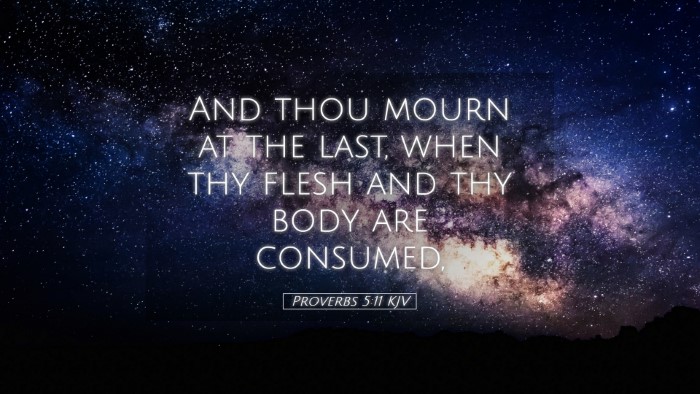Commentary on Proverbs 5:11
Proverbs 5:11 states, "And thou mourn at the last, when thy flesh and thy body are consumed." This verse serves as a strong warning against the temptations of immorality, emphasizing the consequences of indulging in lustful and illicit desires. Through the synthesized insights from esteemed public domain commentaries, we explore the depth of this passage with particular focus on moral, spiritual, and practical implications.
Exegesis and Context
Understanding this verse necessitates a closer examination of its context within the book of Proverbs. Proverbs is a collection of wise sayings and teachings often attributed to King Solomon, aimed primarily at imparting wisdom for moral living and righteous conduct. The surrounding verses in chapter 5 discuss the perils of adultery, the seduction of the immoral woman, and the catastrophic effects of engaging in such behaviors.
Historical Context
In ancient Israel, as today, sexual immorality was a significant issue. Wisdom literature often emphasizes the importance of fidelity and warns against the seductive allure of those who lead others into sinful practices. This particular proverb employs imagery of mourning, reflecting the deep physical, emotional, and spiritual costs associated with straying from the path of righteousness.
Insights from Matthew Henry
Matthew Henry, in his renowned commentary, notes that the mourning referenced here is the sorrow that a person feels when contemplating the consequences of their actions. He highlights several key points:
- Sorrow at the end: Henry points out that those who indulge in lust may find temporary pleasure, but they ultimately face immense regret.
- Physical and spiritual consumption: The phrase "when thy flesh and thy body are consumed" reflects both the physical degradation from sinful practices and the spiritual consequences of straying from God's commands.
- The inevitability of consequences: Henry emphasizes that such mourning is inevitable for those who do not heed wisdom's warnings.
Insights from Albert Barnes
Albert Barnes offers additional wisdom in his commentary, expounding on the themes of remorse and regret. He notes:
- Regret as an outcome: Barnes observes that the mourning occurs after the indulgence, pointing to the timing of regret—too late to undo the harm.
- The nature of consumption: He elaborates on the consumption of both flesh and body, suggesting the totality of loss that comes from wasteful living, including physical health, wealth, and integrity.
- The need for foresight: Barnes encourages readers to consider the long-term implications of their choices, emphasizing that wisdom would steer one away from paths leading to such mourning.
Insights from Adam Clarke
Adam Clarke expands upon the psychological aspects of this verse and its implications for today's believers. He emphasizes:
- The emotional impact: Clarke articulates the profound emotional devastation that accompanies sinful choices and how this reflects a life of wasted potential.
- Spiritual decay: He links the physical toll described in the verse with a decline in spiritual health, warning that such choices can lead to lasting separation from God.
- The importance of self-control: Clarke urges individuals to cultivate self-discipline as a key to avoiding the mourning that follows lustful pursuits.
Theological Implications
This verse carries with it significant theological implications. It reminds believers of the intrinsic relationship between morality and divine wisdom. The consequences of sin are embedded in the natural order as much as they are moral or spiritual.
Moral Integrity
Pastors and leaders are called to emphasize moral integrity in their teachings, highlighting that the choices we make regarding temptation can have lifelong repercussions.
The Role of Regret
Regret and mourning can serve as tools for introspection and repentance, calling believers back to faithfulness and integrity in their lives.
Practical Applications
For pastors, students, and theologians, several practical applications emerge from understanding Proverbs 5:11:
- Teaching on Temptation: Address the reality of temptation in a straightforward manner, equipping congregants with tools to resist.
- Encouraging Accountability: Foster environments where individuals feel safe to discuss their struggles and seek help in overcoming sinful patterns.
- Highlighting Redemption: Emphasize that while the consequences of sin are serious, there is redemption and hope through Jesus Christ.
Conclusion
Proverbs 5:11 serves as a crucial reminder of the serious consequences of sinful choices. Through the lens of historical and moral insights provided by Matthew Henry, Albert Barnes, and Adam Clarke, one can appreciate the weight of this proverb. It not only calls for vigilance against temptation but also offers a path of repentance and hope for restoration. As we reflect on this verse, let us pursue wisdom and understanding, leading lives marked by integrity, faithfulness, and an awareness of the lasting impact of our choices.


